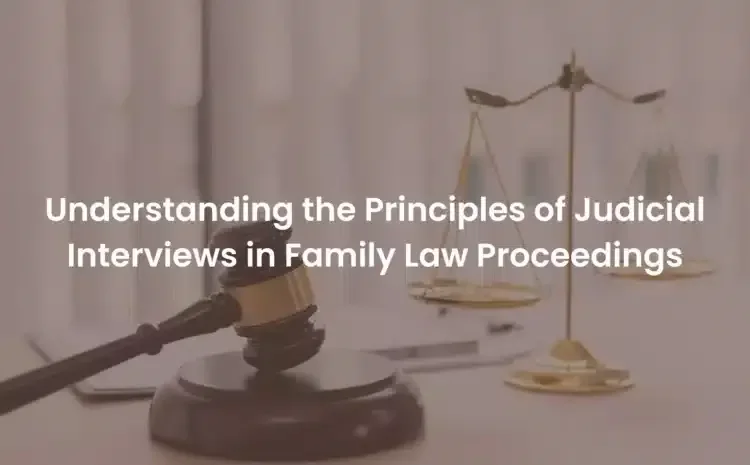Understanding the Principles of Judicial Interviews in Family Law Proceedings
In family law proceedings, the welfare and best interests of children are paramount considerations. One essential tool that courts utilize to ensure these principles are upheld is the judicial interview. On 7 February 2024, the Singapore Court of Appeal issued a seminal decision, WKM v WKN [2024] SGCA 1, setting out the principles of judicial interviews and child welfare reports in contentious divorces involving children’s issues. We will explore the decision in two blog posts.
Judicial interviews play a crucial role in providing children with a voice in legal proceedings that directly impact their lives. Let’s delve into the principles that guide judicial interviews and their significance in family law cases.
The Initial Dispute: The case of WKM v WKN originated from a dispute between the parents over care and control arrangements for their child. The acrimonious relationship between the parents added a layer of complexity to the proceedings, leading to concerns about potential parental alienation and the child’s well-being being compromised.
Allegations and Counter-Allegations: The case took a contentious turn with allegations and counter-allegations of emotional abuse, neglect, and other serious issues involving the child. These accusations further heightened tensions between the parties and underscored the need for a thorough and impartial assessment of the situation to determine the best interests of the child.
Judicial Intervention: In the midst of escalating conflicts and conflicting claims, judicial intervention became necessary to safeguard the child’s welfare. The court’s decision to conduct a judicial interview with the child played a pivotal role in gathering firsthand insights into the child’s preferences and feelings, ultimately influencing the care and control arrangements.
The principles of judicial interview held by the Court of Appeal were as follows.
Principle 1: Child-Centric Approach At the core of judicial interviews is a child-centric approach. The primary aim is to prioritize the child’s welfare and well-being by allowing them to express their views, preferences, and concerns directly to the judge. This approach ensures that the child’s voice is heard and considered in decisions regarding care and control arrangements.
Principle 2: Impartiality and Objectivity Judicial interviews are conducted with impartiality and objectivity. Judges approach these interviews with a neutral stance, seeking to understand the child’s perspective without bias. By maintaining objectivity, judges can make decisions that are truly in the child’s best interests, free from external influences.
Principle 3: Transparency and Accountability Transparency and accountability are key principles guiding judicial interviews. Judges must conduct these interviews in a transparent manner, ensuring that all parties involved understand the process and its implications. Additionally, judges are accountable for the decisions made based on the information gathered during the interviews.
Principle 4: Child-Focused Communication Effective communication is essential during judicial interviews. Judges must communicate with children in a clear, age-appropriate, and sensitive manner. By using child-focused language and techniques, judges can create a safe and supportive environment for children to express themselves freely.
Principle 5: Supplementary Role While judicial interviews are valuable, they are not the sole source of information in family law proceedings. They supplement other evidence, such as welfare reports and expert opinions, to provide a comprehensive understanding of the child’s situation. This holistic approach ensures that decisions are well-informed and consider all relevant factors.
Conclusion In conclusion, the principles of judicial interviews in family law proceedings are rooted in the best interests of the child. By upholding a child-centric approach, impartiality, transparency, effective communication, and a supplementary role, judicial interviews serve as a vital tool in ensuring that children’s voices are heard and their welfare is prioritized in legal proceedings. These principles underscore the importance of considering the unique perspectives and needs of children when making decisions that impact their lives.
Our lawyers hold much experience with contentious divorce proceedings and the use of judicial interview in such cases. Contact us at 8780-2499 to find out more.

